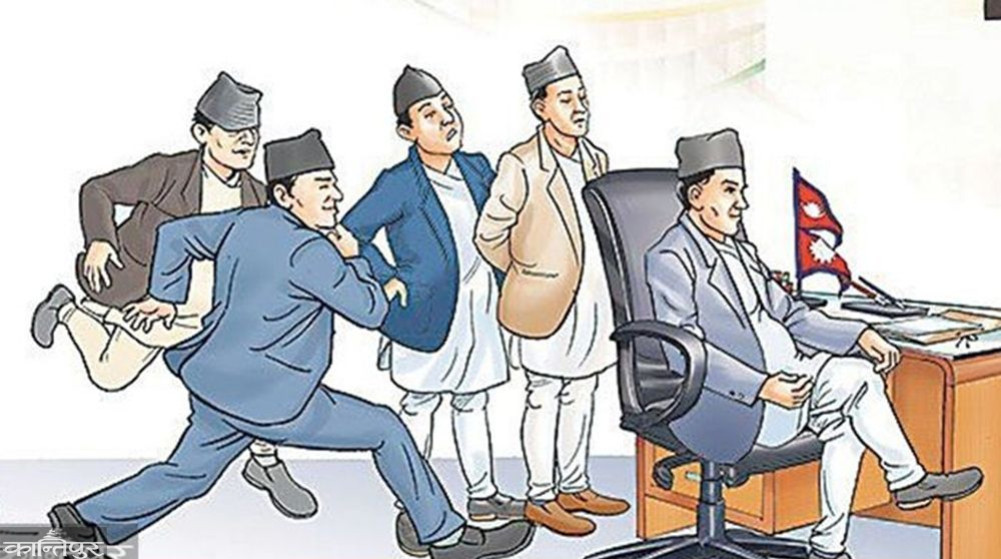Indifference to improving the economy for how long?
We use Google Cloud Translation Services. Google requires we provide the following disclaimer relating to use of this service:
This service may contain translations powered by Google. Google disclaims all warranties related to the translations, expressed or implied, including any warranties of accuracy, reliability, and any implied warranties of merchantability, fitness for a particular purpose, and noninfringement.


It is no secret that our economy faces challenges. We politicians have two glasses to look at the economy. When he is in the government, he sees the economy as good, that the previous government and even the finance minister spoiled it, and when he is in the opposition, he sees a mountain of challenges and that the current government has destroyed what he did well.



No matter what we argue politically, it is not difficult to say that our economy is in trouble today. It is too late for all of us to find solutions together.
Increasing remittances, increasing foreign exchange reserves, current account surpluses alone cannot make the economy sustainable. In order for the economy to run, government capital budget expenditure had to increase, employment had to increase. It had to run from industrialists to small shops, both credit and deposits of banks had to expand, bad loan ratio of banks had to be reduced etc. Well? All these indicators are negative.
Young people have either entered the city in search of work, or have gone abroad. Villages are empty. The edges and edges of the fields are grasslands. Small and medium entrepreneurs are saying that they cannot pay the bank loans. The government data itself is telling that there has been a decrease in consumption. In informal conversations, bankers themselves have started saying that the bad loans of the bank have reached almost 10 percent. This is a dire situation. There is no doubt that the coming days will be very difficult for Nepal and Nepali if we engage in the game of changing the government in the name of political equation or alliance and leave the economy as it is.
When there are daily political tussles, obstruction of the parliament, and the government mentality that the opposition should be met under this or that excuse, can we say that our country is good for investment, come and invest? Do we go to invest in a country where that is happening? That we are holding a ritual investment conference this year as in the past? Or we have a big interest in it.
The crux of the economy's problem is the inability to spend capital funds allocated by the government. Considering this situation as a factor in the inability to spend the budget, we made a provision in the constitution that the finance minister would present the budget on May 15. But even then the problem is the same. After all, the problem is over. The problem lies in our spending power. The problem is that the leaders chose the project without any study based on what the leaders said. The problem is allocating the budget without empowering the provincial and local levels. Even after 9 months of the current financial year in the Union, it is not acceptable for the capital expenditure to be around 30%. Even the figures of the state government and local level are pathetic. Neither the laws nor the regulations are a hindrance, if there are hindrances, our ability and regular monitoring. Tomorrow cannot be spent without these two. This is where all the problems start when the allocated funds are not spent. This is the first and foremost reason why production, consumption, income, services, employment are all negative.
Second, migration of young people abroad:
We see a long line of young people migrating abroad every day at the airport. They go out for study and work. Until recently, young people going to America, Australia, Europe for study and Gulf, Malaysia, Korea for work used to meet at the airport. Now, bankers, doctors, engineers, chartered accountants who have been working in Nepal have started migrating abroad. On the one hand, we do not get tired of making empty speeches about bringing back the youth who went abroad for studies, but the situation has become different. The main reasons for this are not encouraging start-up businesses, not providing an environment for entrepreneurs to work, and the mindset of criminalizing entrepreneurs. Let's stop such wrong trends. Third, the gap between imports and exports:
We import goods and services worth 100 rupees and export 10 rupees. This is the problem with our economy. A major part of our imports or about 18 percent goes to petroleum products. Likewise, we import food worth billions. While we can produce food ourselves to meet most of the demand. We can reduce a large part of petroleum consumption by generating electricity. How long will the person who walks with a river in his bag be called an entrepreneur? Let's generate electricity, consume it, replace imports, then sell it if there is more. Let's drive an electric vehicle. Let's use electricity for cooking and other purposes. Now let's make hydroelectricity a reservoir that can produce electricity for twelve months. Let's encourage the software industry, not discourage it. If there is a problem in the law somewhere, let's amend it. 25 Crops are not commercialized by keeping land limits. Farming on small plots of land is only subsistence farming and import substitution is difficult for subsistence farming. Let's make agriculture an enterprise, it is not difficult to reach a situation where we do not have to import agricultural products in three years.
Fourth, foreign investment:
The constant political upheaval, the tendency of small parties to influence the big parties and the tendency to control the power and businessmen treated like criminals, foreign investment cannot be imagined. The leadership of the government will be led by the big parties based on the public opinion in the Union and the provinces and supported by the smaller parties. It is useless to talk about foreign investment in the situation of constant parliamentary obstruction, old laws that are not updated and doubts between the government and entrepreneurs. Whether it's Ncell or Bansbari leather shoes, whether it's the process of imprisoning bankers or the taxation of software companies, there has always been a mistake somewhere. How to convince foreign investors? In such a situation, the protection of domestic capital can be a challenge, while foreign capital is just a dream. Fifth, the financial sector:
In Nepal, the financial sector with strong regulatory bodies and skilled employees is in trouble these days, while the cooperative sector, which mobilizes the savings of millions of small savers, is in shambles. The effect of reconciliations made during the Covid epidemic in banks is now visible. The bank could not be functioning if other economic sectors were not functioning. However, this area seems to be comparatively safer than others. Bank investors have to be patient if they don't get returns for a few years. Now, through the next phase of reform, the interest rate of the bank must be fixed for a certain period of the loan. It benefits both the bank and the businessmen. The cooperative sector is chaotic. Under the guise of self-regulation, a limited number of individuals have ruined the cooperative sector and more particularly the savings and loan cooperatives. Economic crimes have been committed here and they are under political protection. Extreme politicization is the biggest problem of cooperative sector. The financial sector must be kept out of politics. Without saying this or that, bringing those who embezzle the money of the cooperative to the legal sphere and forming an effective regulatory body is the main need of the day and the time. If it is limited to political gossip only, it is certain that about 2 trillion rupees of small savers will sink. What prevents cooperatives that have a turnover of more than five million rupees to be brought under the regulation of Nepal Rastra Bank without delay?
Sixth, tourism:
Nepal's tourism sector is active and growing. Our mountains and mountain peaks, lakes and forests, centers of religious faith can attract millions if not millions of tourists a year. Moreover, the possibilities of internal tourism are unlimited. Let's encourage those who enter this sector, make airports operate efficiently and improve road maintenance. The rest of the work is done by the businessmen themselves. In the end,
Accumulation of money in the government treasury is not a strong economy, the balance between revenue and expenditure is an indicator of a strong economy. Looking at the data of 9 months of the current financial year, we do not hesitate to say that we have wasted financially this year as well. How long will this situation last in the name of political expediency? Still not thinking? Do nothing for the country? You don't do it yourself and don't let those who do it?
 प्रकाशित : वैशाख ९, २०८१ ०७:५५
प्रकाशित : वैशाख ९, २०८१ ०७:५५

 २१.१२°C काठमाडौं
२१.१२°C काठमाडौं
















